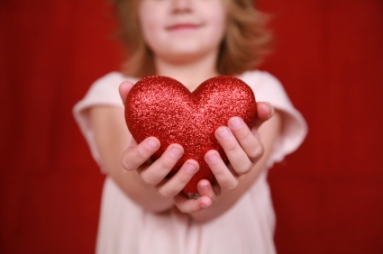Happy Random Acts of Kindness Week! It’s good timing for me, since I recently re-watched my DVD of What the Bleep Do We Know. I have been reminded, once again, how negativity affects us. The more we nurse anger, resentment, ill will, the more we reinforce biology in our brains that leads to more of those negative emotions. We can actually become addicted to them.
According to the scientists interviewed in What the Bleep, our cells have receptors for various types of peptides. The peptides in heroin use the same type of receptors as our emotional neuropeptides. We can become addicted to any neuropeptide, in other words, to any emotion.
When anger continually bombards our cells with more of its particular neuropeptide than is normal, then when those cells divide to form new cells, they adjust for that increased volume of the emotional neuropeptide. The new cell has more of the type of receptor that is able to receive that emotional neuropeptide, and fewer of the receptors for beneficial peptides, such as those that promote the health of our bones, digestive tract and skin. We age faster, and we develop more health issues when our cells adjust for excessive emotional neuropeptides.
If you don’t buy this explanation, there are plenty of other ways to support the fact that nurturing negative thoughts and emotions harms us. What the Bleep features experiments by Dr. Masaru Emoto in which various vessels of water were labeled either with a positive term about peace or love, or a negative term about hate or the like. When the water froze, the ice in the vessels with positive labels formed beautiful crystal patterns, while that in the vessels with negative messages formed ugly, asymmetrical patterns.
More recently, Masaru conducted similar experiments on containers of rice, asking volunteers to focus either positive or negative thoughts on respective containers. The rice in the containers that received negative thoughts rotted faster, while the rice in the containers that received positive thoughts stayed fresh longer. http://www.spiritscienceandmetaphysics.com/scientific-proof-thoughts-and-intentions-can-alter-the-world-around-us/
As What the Bleep says, considering the fact that our bodies comprise mostly water, “If thoughts can do that to water, imagine what our thoughts can do to us.”
It’s hard to avoid negativity these days. Advertisements urge us to buy products and services to save ourselves from burglary, health problems, every problem they can think of. We are bombarded by negative and hateful political messages. Marketers and political entities do this because fear is an effective short-term way to motivate people to take a desired action.
Then there’s the stress of modern life. Instead of using the speed and efficiency of modern technology to get through our work quicker and enjoy better quality of life, we (or our bosses, customers or clients) only expect us to do a larger amount of work.
The stress response of fight or flight evolved for the occasional physically threatening event, like the sight of a saber-toothed cat. When the cat went away, the stress dropped fairly quickly. But modern life keeps us stressed for much longer than is good for us. Our biological evolution can’t keep pace with our social changes.
We can change our neurochemistry. Even if the peptide receptor theory doesn’t grab you, even if you don’t buy the analogy between Dr. Emoto’s experiments and the human body, you can test the value of positivity by giving it the old college try.
But repeatedly telling ourselves not to think about something tends to backfire. Just telling yourself not to think about burglary is, in itself, a thought about burglary.
What works better is nurturing positive thoughts and emotions, crowding out the negative. And nothing works better than random acts of kindness. When you perform a kind act, you benefit even more than the person for whom you do it. Your benefits arrive in the form of calmness, peace and positive feelings.
What the Bleep cautions us to expect some instinctive resistance, or even discomfort, when we begin to consciously change our neurochemistry by nurturing positive thoughts and emotions. It’s a little like withdrawal from a drug. But when you see how your health and happiness improve, you’ll be glad you stuck with the program.
And calm, peaceful, positive people achieve better results in dealing with others—negotiating, persuading, building consensus.
So let’s take this Random Acts of Kindness Week as a starting point for a regular practice of kindness. You might start by sending Valentines to people who aren’t expecting them. Let another driver merge in ahead of you in traffic. Give a waitress an especially nice tip. At a party or gathering, reach out to someone who is standing or sitting alone. Stretch even more with a kind act toward someone you disagree with.
Then keep it up beyond this week. You’ll become a healthier, happier person and a better consensus builder. And as always, I would love to hear about your experiences.

